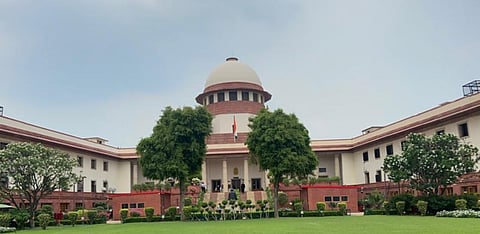

The Supreme Court's Constitution bench is likely to clarify whether the 2018 Act which restored the Union Government's mandatory sanction for initiating investigation in corruption cases would have retroactive application, although the Act's validity has been under challenge before another bench.
—
THIS week, a constitution bench led by Justice S.K. Kaul heard two-day long arguments on the retrospective application of Section 6A of the Delhi Special Police Establishment Act, 1946 ('DSPE Act'). The question before the bench was whether striking down a protective provision would have a retrospective effect in view of the rights protected under Article 20(1).
The bench, which also consisted of Justices Sanjiv Khanna, A. S. Oka, Vikram Nath and J. K. Maheshwari, reserved its judgment in the matter on Wednesday after the conclusion of arguments.
Section 6A of the DSPE Act requires the government's prior sanction to proceed in corruption cases against officers of the rank of joint secretary and above. But an exception provided in Section 6A(2) states that no approval is necessary for cases involving arrest of a person on the spot on the charge of accepting or attempting to accept a bribe.
The petitioner, Dr. R.R. Kishore, who was at the time a Chief District Medical Officer in Delhi — and was of the rank of Joint Secretary— was arrested by the CBI in 2004 for accepting a bribe. He had subsequently challenged the arrest in the Delhi High Court, which ruled that the arrest had been "pre-meditated", rather than "on the spot", and therefore, the exception under 6A(2) did not apply. The high court in 2006 ordered a re-investigation, subject to the Union Government's granting the requisite sanction.
In the hearing before the Supreme Court, Dr. Kishore, appearing for himself, argued that after Section 6A was struck down by the Supreme Court in Subramanian Swamy versus CBI (2014), the protection was reinstated by the legislature in 2018 and hence, if applied retrospectively, the provision grants him protection.
Justice Kaul summarised the petitioner's argument by stating that "Your best case forward is only that this is a protective measure available to you and since the protective measure has been declared as ultra vires on the principle of discrimination and (the legislature had expanded it in response), it should not be lifted in the interregnum period."
Section 6A of the DSPE Act, 1946 was added in 2003 through Section 26 of the Central Vigilance Commission Act, 2003 ('CVC Act'). The constitutional validity of section 6A came into question in the Subramanian Swamy case where the Supreme Court held the provision to be violative of Article 14 for extending its protection only to certain government officers. However, the Supreme Court did not find the protection "bad in law" per se or specify whether its decision would apply retrospectively.
To nullify the above judgment, the legislature brought in an amendment in 2018 to the Prevention of Corruption Act, 1988 by adding Section 17A, extending the immunity even to retired government officers.
Dr. Kishore argued that since the Subramanian Swamy judgment had declared Section 6A unconstitutional on the limited issue of being violative of Article 14 and since the infirmity had been fixed and the immunity restored by the Parliament, the protection should be considered to be applicable in a way that it was never struck down.
Solicitor General, Tushar Mehta for the Union Government, however, argued that Section 17A of the PC Act was not intended as a replica of Section 6A DSPE Act. It may be noted here Section 17A is also currently under challenge in the Supreme Court on a PIL filed by Center for Public Interest Litigation (CPIL) for being contrary to the Subramanian Swamy judgment. The case was last heard on February 15, 2019.
Mehta argued that the Supreme Court would open "floodgates of litigation" if it agreed with the petitioner's argument.
Substantive safeguard
Meanwhile, senior advocate, Arvind Datar urged the court to read Section 6A as an immunity not just from conviction but also from investigation. Datar contended that Article 20(1) and Article 21 of the Constitution should be read jointly, implying that protection under Article 20 should encompass both procedural and substantive safeguards.
To Datar's assertion, Justice Kaul replied, "Reading the provisions of Article 21 into 20(1) would create a lot of issues and problems in a given situation. When we lay down the law, rights under 21 are definitely protected. But one cannot say that sanction is protection under 21", referring to the sanction needed under DSPE Act.
Mehta, arguing against the collective reading of Article 20(1) and 21 stated, "What is prohibited under Article 20 is protection from conviction or sentence under an ex post facto law and not trial for such offence. Procedure is not prohibited by Article 20".
Datar made an additional request to the bench to declare clearly if a particular judgment would have a prospective, retrospective or retroactive effect on each instance where it holds a statute to be unconstitutional.
On the retrospective application of legal statutes, Justice Kaul described the law as being perpetually in a state of flux, commenting that "The law does not remain on the ventilator. Law is as it exists. It does not remain on the statute books once it is struck down as invalid. It was like it had never existed."